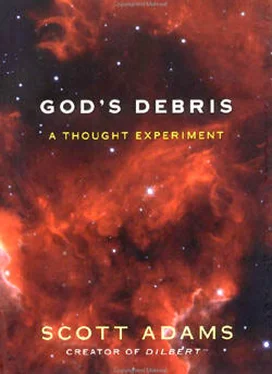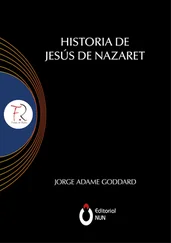“For example, some physicists describe gravity in terms of ten dimensions all curled up. But those aren’t real words—just placeholders, used to refer to parts of abstract equations. Even if the equations someday prove useful, it would say nothing about the existence of other dimensions. Words such as dimension and field and infinity are nothing more than conveniences for mathematicians and scientists. They are not descriptions of reality, yet we accept them as such because everyone is sure someone else knows what the words mean.”
I listened. Rocking, mildly stunned.
“Have you heard of string theory?” he asked.
“Sort of.”
“String theory says that all of physical reality—from gravity to magnetism to light—can be explained in one grand theory that involves tiny, string-shaped, vibrating objects. String theory has produced no useful results. It has never been proven by experiment, yet thousands of physicists are dedicating their careers to it on the faith that it smells right.”
“Maybe it is right.” It seemed like my turn to say something.
“Every generation of humans believed it had all the answers it needed, except for a few mysteries they assumed would be solved at any moment. And they all believed their ancestors were simplistic and deluded. What are the odds that you are the first generation of humans who will understand reality?”
“I don’t think the odds are bad. Everything has to happen for a first time. You were around to see computers invented and to see space travel. Maybe we’ll be the first for this string theory.”
“Computers and rocket ships are examples of inventions, not of understanding,” he said. “All that is needed to build machines is the knowledge that when one thing happens, another thing happens as a result. It’s an accumulation of simple patterns. A dog can learn patterns. There is no ‘why’ in those examples. We don’t understand why electricity travels. We don’t know why light travels at a constant speed forever. All we can do is observe and record patterns.”
Where Is Free Will Located?
“Where is your free will?” the old man asked. “Is it part of your brain, or does it emanate from someplace outside your body and somehow control your actions?”
“A few minutes ago I would have said I knew the answer to that question. But you’re making me doubt some of my assumptions.”
“Doubting is good,” he said. “But tell me where you think free will comes from.”
“I’ll say it comes from my brain. I mean, it’s a function of my brain. I don’t have a better answer.”
“Your brain is like a machine in many ways, isn’t it?” he asked.
It sounded like a trick question, so I gave myself some wiggle room. “The brain isn’t exactly like a machine.”
“The brain is composed of cells and neurons and chemicals and pathways and electrical activity that all conform to physical laws. When part of your brain is stimulated in one specific way, could it respond any way it wants, or would it always respond in one specific way?”
“There’s no way to test that. No one knows.”
“Then you believe we can only know things that have been tested?” he asked.
“I’m not saying that.”
“Then you’re not saying anything, are you?”
It felt that way.
“So where is free will?” he asked again.
“It must involve the soul.” I didn’t have a better answer.
“Soul? Where is the soul located?”
“It’s not located anywhere. It just is.”
“Then the soul is not physical in nature, according to you,” he said.
“I guess not. Otherwise someone probably would have found physical evidence of it,” I said.
“So you believe that the soul, which is not physical, can influence the brain, which is physical?”
“I’ve never thought about it in those terms, but I guess I do believe that.”
“Do you believe the soul can influence other physical things, like a car or a watch?”
“No, I think souls only affect brains.” I was crawling out on a limb with lead weights strapped to my belt.
“Can your soul influence other people’s brains, or does it know which brain is yours?”
“My soul must know which brain is mine, otherwise I’d be influenced by other souls and I wouldn’t have free will.”
He paused. “Your soul, according to you, knows the difference between your brain and everything else that is not your brain. And it never makes a mistake in that regard. That means your soul has structure and rules, like a machine.”
“It must,” I agreed.
“If the soul is the source of free will, then it must be weighing alternatives and making decisions.”
“That’s its job.”
“But that’s what brains do. Why would you need a soul to do what a brain can do?” he asked.
“Maybe the soul has free will and the brain doesn’t,” I said. “Or the soul causes your brain to have free will. Or the soul is smarter or more moral than the brain. I don’t know.” I tried to put my fingers in as many holes as possible.
“If the soul’s actions are not controlled by rules, that can only mean the soul acts randomly. On the other hand, if your soul is guided by rules, which in turn guide you, then you have no free will. You are programmed. There is no in between; your life is either random or predetermined. Which is it?”
I wasn’t prepared to believe I had no control over my own life. “Maybe God is guiding my soul,” I said.
“If God is guiding your soul and your soul is guiding your brain, then you are nothing more than a puppet of God. You don’t really have free will in that case, do you?”
I tried again. “Maybe God is guiding my soul in a sort of directional way, but it’s up to me to figure out the exact steps to take.”
“That sounds as if God is giving you some sort of an intelligence test. If you make the right choices, good things happen to your soul. Is that what you’re saying?”
“It’s not about intelligence, it’s about morality,” I said.
“Morality?”
“Yes, morality.” I felt I was making a good point even though I didn’t know what it was.
“Is your brain involved in making moral decisions or do those decisions get made someplace outside your body?” he asked.
I groaned.
I needed reinforcements. “Look,” I said, “four billion people believe in some sort of God and free will. They can’t all be wrong.”
“Very few people believe in God,” he replied.
I didn’t see how he could deny the obvious. “Of course they do. Billions of people believe in God.”
The old man leaned toward me, resting a blanketed elbow on the arm of his rocker.
“Four billion people say they believe in God, but few genuinely believe. If people believed in God, they would live every minute of their lives in support of that belief. Rich people would give their wealth to the needy. Everyone would be frantic to determine which religion was the true one. No one could be comfortable in the thought that they might have picked the wrong religion and blundered into eternal damnation, or bad reincarnation, or some other unthinkable consequence. People would dedicate their lives to converting others to their religions.
“A belief in God would demand one hundred percent obsessive devotion, influencing every waking moment of
this brief life on earth. But your four billion so-called believers do not live their lives in that fashion, except for a few. The majority believe in the usefulness of their beliefs—an earthly and practical utility—but they do not believe in the underlying reality.”
Читать дальше












